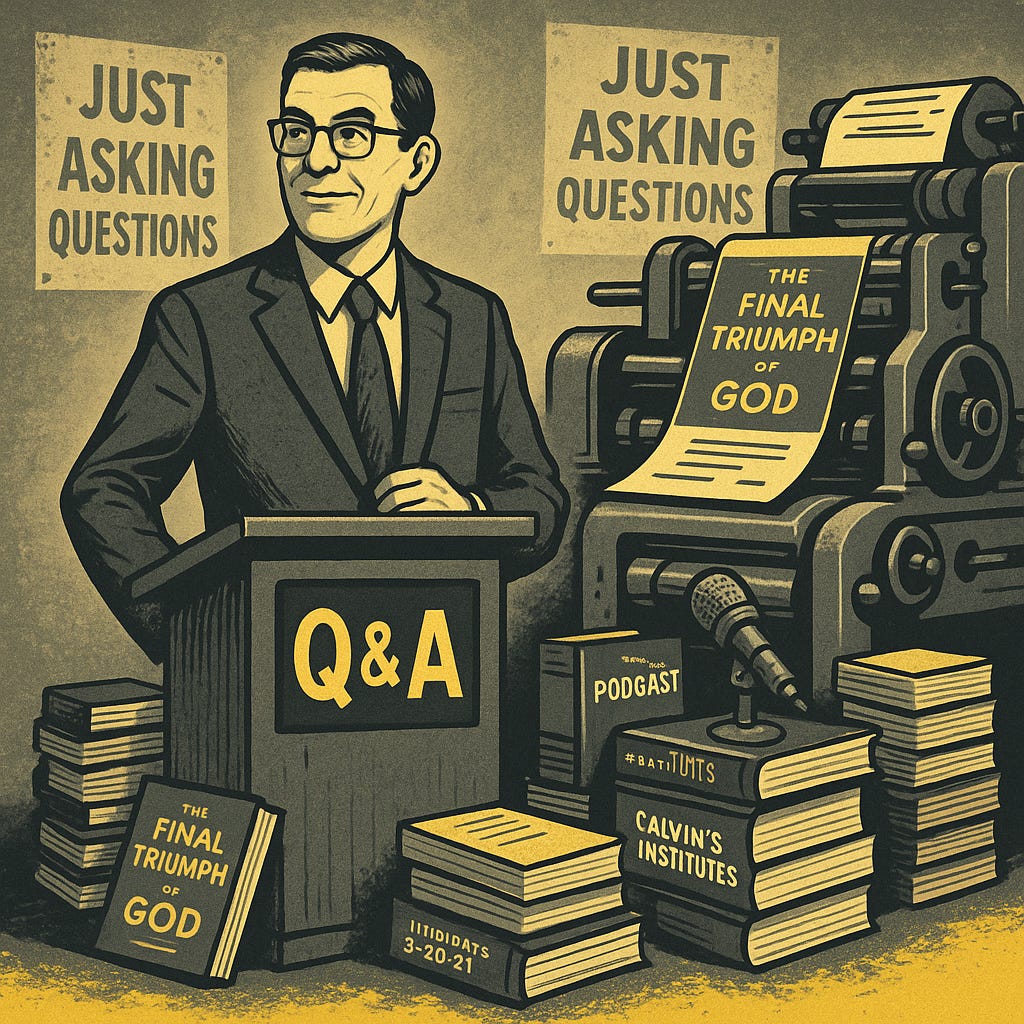Mellō Yellow : “Only Responding,” or Actively Rebranding?
Gary’s Evasive Posture
Perhaps the most exasperating aspect of Gary DeMar’s rhetoric is his repeated insistence that he is merely responding to others and not initiating anything. In Gary’s narrative, he’s the embattled truth-seeker who didn’t want a fight – just innocently "asking questions" until others forced his hand. He loves to portray himself as the reluctant responder, never the instigator. This posture is meant to make him seem measured and victimized – "Look, I’m not attacking anyone; I’m just defending myself." But the facts undermine Gary’s spin. In reality, Gary has proactively driven this discussion and reshaped his ministry around it, all while claiming to be merely reacting.
Consider the timeline: After receiving a private letter from concerned pastors and colleagues asking him to clarify his beliefs on the Second Coming and resurrection (a letter he never answered directly), Gary launched a new podcast series with his hyper-preterist partner Kim Burgess.1 This was not a passive response but a strategic platform to promote what they openly call "consistent preterism." The podcast turned into a two-volume, 700+ page work titled The Hope of Israel and the Nations: New Testament Eschatology Accomplished and Applied. In the introduction, they state plainly: "We affirm a position on preterism that seeks to do full and consistent justice to the eschaton of Israel’s redemptive history in the period of AD 30 to 70 in the person and work of Christ."2
This is not neutral inquiry. It is an unambiguous theological assertion. Burgess even admits, "this newer perspective also belongs in the camp generally referred to as ‘full preterism,’"3 though he tries to distinguish it from "hyper preterism"4 and rejects partial preterism. The semantic dodging does not conceal the reality. Gary and Kim are promoting what is effectively full preterism, rebranded. You don’t co-author a 700-page theological treatise if you have no settled position. Clearly, DeMar does have a position, and he’s willing to advance it in print and take your money for it. The false pretense of neutrality collapses under the weight of his own work.
Moreover, Gary has published numerous articles and podcast episodes further defending and explaining his views, all while continuing to insist he’s "just responding." For instance, in "Is Lip Service Being Paid to Sola Scriptura?" he implicitly defends his preterist leanings against creedal critics. In "Frost Advisory in the Debate Over Eschatology," he explicitly attacks Sam Frost and myself. Yet when P. Andrew Sandlin wrote an open letter urging Gary to clarify his views, Gary refused to answer the direct questions, complaining instead about tone and "narrow focus." He then framed the entire situation on his blog as a witch-hunt against him.
Gary prefers monologue to dialogue. He responds only on his own terms, using articles and podcasts where he controls the narrative. He avoids mutual back-and-forths where he might have to answer questions directly. His repeated refrain that he’s “only responding” is a calculated rhetorical maneuver. It casts him as the reasonable thinker under fire and his critics as aggressors.
Gary’s evasive posture was clear in a recent podcast with Eric. He brought up Sam Frost—only to call him "irrelevant." If that were true, why mention him? It’s a bait-and-switch: use Sam when convenient, dismiss him when not. He’s done the same with me—calling me a "minor player" while dedicating multiple posts and podcasts to my critiques.
Gary also pointed to a lack of comments on my work as if that proves irrelevance. But truth isn’t measured by comment counts. If so, American Vision’s own low engagement would indict his platform too.
The contradiction is glaring: Gary claims neutrality while aggressively promoting his views and attacking critics. He’s not just reacting—he’s campaigning.
The pretense is over. Gary DeMar is not merely responding. He is actively propagating a position—a hyper-preterist one dressed up as something more palatable. He cannot hide behind "just asking questions" while publishing definitive answers. He cannot claim neutrality while selling books and podcasts filled with doctrinal assertions. He cannot dismiss critics while engaging them at length.
In short, Gary’s evasive posture is a rhetorical smokescreen. He is shaping this “debate,” not reacting to it. If he wants to be taken seriously, he must drop the act, own his views, and engage the full counsel of Scripture. That includes dealing with Acts 26:22, 1 Corinthians 15, John 6, and the theological nature of the resurrection. It means facing the consequences of his views, not hiding behind lexical trivia or shifting labels.
I remain committed to the historic Christian hope—a future, bodily resurrection and the visible return of Christ. The "consistent preterism" Gary now espouses is neither biblical nor historic. It is a doctrinal innovation wrapped in rhetorical evasion. My goal in writing "Mellō Yellow" is to shine a light through that yellow smoke and expose the real issues. As Luther said at Worms: "Here I stand, I can do no other." Let Gary defend his position without pretense or posturing. The truth will stand or fall on the strength of the Word, not on who can play the victim best.
The challenge for Gary is straightforward: stop posing as a passive questioner and own the conclusions he’s already promoted. Stop name-dropping critics only to dismiss them, and stop treating comment sections as barometers of truth. If his theology is truly reformational, let him defend it openly and thoroughly. Otherwise, his posture is just that—a posture.
The pattern is obvious: Gary floats controversial claims, then retreats into ambiguity. He calls for clarity but dodges direct challenges. He wants to revise doctrine without bearing the weight of accountability. But orthodoxy demands scrutiny. Gary has planted his flag—it’s time he stopped pretending otherwise.
The private letter was not sent out of nowhere. It was prompted by Gary’s increasingly public promotion of hyper-preterist talking points—such as questioning whether the creeds got the timing wrong, and mocking the idea of physical bodies being raised from the dust. These statements raised serious concerns among pastors and colleagues who had long supported his ministry. They sounded eerily similar to views historically associated with full (hyper) preterism. In response to this doctrinal shift, a group of concerned ministers sent Gary the private letter—seeking clarification, not confrontation. His public comments set off the alarm; the letter was the measured response. After evading that for a few months and launching the new podcast, the letter was then made public.
Kim Burgess and Gary DeMar, The Hope of Israel and the Nations: New Testament Eschatology Accomplished and Applied, Vol. 1 (Powder Springs, GA: American Vision, 2024), xvii.
Ibid., xviii.
This is misleading. Hyper preterism is just another name for full preterism.






